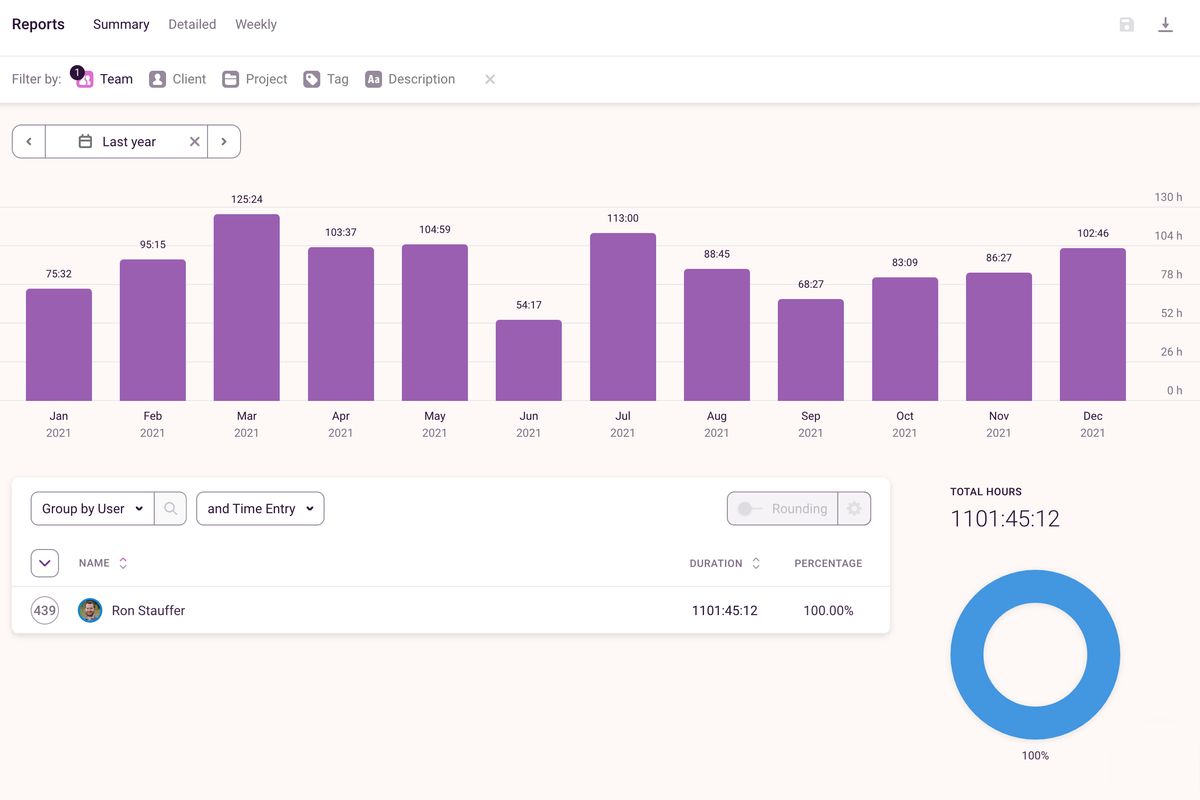One of the biggest mistakes I see freelancers make is not tracking their time. I don't mean if they're working hourly: most freelancers are exceptionally good and ethical about tracking their time when they work on a project they bill by the hour.
No, I'm talking about all the other work you do that isn't necessarily billed hourly to the client but should be "billed hourly" to your own company in order to track the profitability of a job, whether the client cares or knows how much time you've put toward it or not.
These days, after nearly 15 years as a business owner, I rarely work on an hourly basis for my clients. I learned early on that hourly rates are not a good way to build a profitable business. In theory, yes, it makes sense. Hypothetically, If I tell a client I'll bill them $100/hour (for example) and I work for 10 hours, I'm going to send them a bill for $1,000 when it's all said and done. That's all fair, doesn't it? So I carefully track the time I put toward their project, then bill them when I hit 10 hours. Right?
Well, kind of. It makes sense on hourly work, but billing for hourly work is a bad model. For a few reasons (that I'll explain more in the future). But let's just say that, hypothetically, I'm not working on a project I bill by the hour, but on a project-fee. That's the "firm-fixed-price" model that I almost always work with, probably 90% of the time these days.
At the end of the day (or at the end of the month, as is more likely), if the client is paying a FFP (firm-fixed-price) for their project, they will not care at all how much time I put toward their project. If my contract to the client is $1,000, they don't care whatsoever whether I put in 10 hours, or 100 hours. What is it to them? All they care is that they contracted with you (or with me, in this case) to provide a finished product for a fixed price that cannot change.
In the scenario above, if I work for 10 hours when I bill the client $1,000, I've made $100/hour (gross). But in that same scenario, if I bid the job wrong, or underestimated the time needed to deliver it, and end up spending 100 hours on it, I've made $10/hour (gross). That's an extreme example, but it isn't by much.
I remember in the early days of my web design company, I was still trying to figure out how to bill for my time and make a profit. I always felt like I was trying to split the atom by somehow cracking a magic code to make my company profitable. It was a constant worry for me. But then, I met a fellow web designer who was struggling with the same thing, but struggling far more than I even knew.
We had a mutual acquantance, and I had always been wary of taking on this client because of some weird quirks I saw in their business model, and I never felt like I would have been valued in the work I provided. As it turned out, my friend ended up working with that client and built a website for their company. The whole process was ridiculously complicated, and drawn out, and it turned out the client was a "client from hell."
When the website was finally launched, I asked my friend how long he had spent on it. "Oh, at least 60 hours." Oof, I thought. That's a lot of time on a pretty simple website. Then I asked the next question, "Wow, what did you charge them for it?" His answer almost knocked my pants off.
"I ended up charging them $500, because I just wanted it to be done so I could move on with my life."
What?!! That's absolutely insane! That meant that my friend, a highly intelligent man with a bachelor's degree in computer science... with two decades of experience had beat his brains out for a client that didn't even care, for $8.33/hour! That was barely minimum wage!
That's totally insane on every possible level! He might as well had gotten a job at McDonalds flipping hamburgers! (No offense to McDonald's workers: there's no shame in a job like that).
This is a problem I've seen over and over again: where freelancers take on projects they're bad at bidding, and they don't really stop to think about how to do it better in the future.
This post is not necessarily about how to make better proposals, although that's a worthy topic. My point right now is: you should track your time on all projects whether you bill hourly or not, so you can look back and do a proper job costing analyses and decide which jobs were and weren't worth doing after the fact.
Since 2010, I have tracked my time obsessively. For the first two years, I made the mistake being super-relaxed about tracking my own time, but after two years, I got really serious about it. Because of that, this means I means I have got twelve years worth of historical data on what I've spent my time on every single working day.
That's amazingly helpful information when it comes time to do a year-end review (which I try to do each year) and determine whether my company is on the right path or not.
Each year, I try to ask myself the following questions:
- Who are my best clients, in terms of profitability?
- Who are my worst clients, in terms of profitability?
- What changes should I make to my business model based on all my booked time this year?
- What changes should I make to my pricing model based on all my booked time this year?
- Which clients or which projects are time wasters?
- Which project did I work on where I made the highest hourly rate? What about the lowest hourly rate? What do I think about that?
- Should I raise my rates?
- Should I work more billable hours, or fewer?
- Am I going to better off this year than last year?
Almost none of these questions can be answered definitively unless you are actually tracking your time. I don't think I can overstate how important this is. When I email Virginia, my bookkeeper, at the end of the year, to ask her questions like "How am I doing? Should I get more or better clients? Should I fire some bad clients? If so, who?" - She's not going to be able to answer any of these questions without the accompanying data that first answers the underlying questions "how much money did you make, and how much time did you spend?"
Over the past dozen years, I've worked on projects where I bid them so poorly I netted about $45/hour, and some projects I bid so spectacularly that I made of $380/hour. How do I know? Because I track it all. (After all, "track everything" is one of my mottos.")
So what's my point? What do I want you to learn and takeaway from this post right now? Easy. If you're a freelancer, do the following, ASAP:
- Track every hour you work, ideally, whether you're billing for it or not but at least for all the time you're working on a specific project.
- At the end of each year, have a bookkeeper or CPA help you review your revenue and cross-reference it with your time-tracking system to find out how profitable each client or project is. After all, if you make $50,000 on one client, that's a lot of revenue. But if you spend 1,000 hours on their project, you've only netted $50/hour.
- If you have great clients, send them a thank-you note or a gift like a Christmas turkey. (Seriously: I've done this before—I've given people an engraved iPod Shuffle as a thank-you).
- If you have bad clients, fire them! This is not a joke. I'm serious: do it. Find a way to tell them you can't work with them anymore, and put space between you and them as quickly as you can. If they're not good clients, move on.
- Learn from the data! Track everything and use it to help you make better decisions. That client you thought was to great to work with; if it turns out they're your worst client because you bill them the smallest amount but they waste the most time, it's time to say goodbye! As I've said many times over the years: every hour you spend working for a bad client is an hour wasted that you could have put toward working with a better client.
Please, I'm begging you: if you're not tracking your time, do so, right now. It's almost the end of the year... make it your New Year's resolution. And if you have any way to analyze the time you've spent this year, take an hour or three and do this exercise on a Saturday to see what you can come up with. The results can be life-changing. This is no exaggeration.
About a month ago, I wrote out all my clients on the big whiteboard in my office. I rated them all based on the following criteria:
- How much do I make each month per client in MRR (monthly recurring revenue)?
- How annoying are they as a client? (This sounds cruel, but it isn't. It's a fair question: do they respect me and my time?)
- How good are they at paying on time?
The results of this exercise shocked me. I learned that the top three clients I had were not exactly the top three I would have expected. I also learned that the bottom three clients I have are awful clients. They don't value my time, don't give me what I need, and pay late on a regular basis.
So what did I do? Well... to be honest, nothing yet. But I will in the next few weeks. But that is only thanks to my good habit of tracking all my time.
If you don't have a time-tracking system already, get one! I don't care: use a paper sheet, or an Excel spreadsheet, or whatever works for you. The tool I have used for the past 12 years is called Toggl Track, and I must say, a dozen years in, I really like it. Check it out: no, I don't even have an affiliate link. I just like the product. I've also tried Harvest, Freshbooks, and Noko Time. I'm sure they're fine, but I've used Toggl for pretty much forever so I'm not going to change unless they do something obnoxious that makes me cancel.
Please, start tracking all your time, right now. It's one of those you can do that will take you an extra 12 minutes every day, but potentially help you make $15,000 more next year.
Do it now. That is all.



Member discussion: